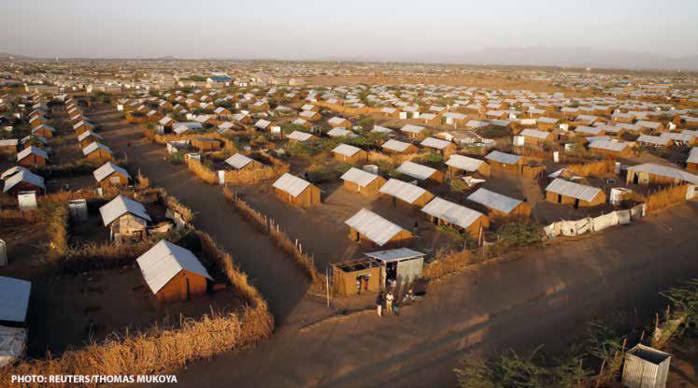
A few kilometres on the outskirts of Kakuma Refugee Camp in Turkana County, a community is thriving.
These are the very first of the group of refugees who came into the country through the Kakuma camps to find permanent residence here.
Sitting on over 5, 000 acres of land and hosting over 40,000 refugees, Kalobeyei Settlement Scheme has been modeled upon one of the options available for refugees in host communities.
Refugees in a foreign country can stay temporarily, seek repatriation to other countries, or resettle or integrate with the host communities.
In Kakuma’s Kalobeyie scheme, these are the refugees who, after staying in Kenya for over twenty years, have opted to make a life for themselves and their families.
In a stark contrast to those still living in refugee camps, those in the resettlement schemes not only have better permanent living quarters, they are also better facilitated to run their daily lives with the dignity bereft of those in the refugee camps.
Here, there is no queuing up for food rations; instead, these refugees have the choice of what to get and when.
“Refugees wetu hapa wanapewa ration card, wanakuwa supplied na kuni, lakini wa settlents wanapeawa babamba kuni, babmba makaa. A lot of bambas at least they can fend for themselves. Ni hali ya kujitegemea, badala ya mtu kupewea rations, apewe chakula, apewe sabuni, anapewa pesa kwa cardi aweze kujitegemea,” Kalobeyei chief Pire Patrick says.
The harsh climatic conditions notwithstanding, the refugee community here is seemingly thriving, but this is not without its challenges coming from both policy level and host community levels.
The community that has welcomed the refugees say the agencies helping the visitors settle down have systematically continued to overlook them and their needs, while seemingly bending over backwards to ensure the comfort of the refugees
According to one female refugee leader, the host community feels it is being discriminated.
“We are being discriminated against, let us treat each of us fairly, mambo ya employment ndio inaleta shida kakuma, they advertise 100, 70 go to refugees,” she said,
The host community also takes issue with the encroachment on their land that has been set aside for the camps present and future needs.
“There’s no more land, because we have given enough, no more land, Kenya is big, we can take refugees to Nairobi, Murang’a, sio kusukuma sisi. Mbuzi yetu hakuna corridors kwa sababu sisi ni watu wa kuhama hama mambo ya kusongesha sisi kila wakati hatutaki,” one of the residents said.
The refugees on the other hand also list their grievances against both the Kenyan government, the refugee agencies and those with whom they share living space.
“Integration ni kitu kizuri kwa wale ambao watataka kubaki hapa, lakini kwa wale watataka kurudi, lakini nimebaki kama nani, ni na uhaki gani tunaposema mambo ya integration,” said Pires Bushira, one of the refugees.
Kenya’s refugees laws have conferred upon them a collection of rights that are aimed at making their lives away from their homes that much easier.
The Refugees Act of 2021, enacted in 2022, allows for refugees to contribute to the economic and social development of Kenya by facilitating access to and issuance of documentation including identification and civil registration documents that are sufficient to identify a refugee.
The government, through the department of refugee services (DRS) says this is already being observed and refugees can now apply for work permit, which it calls a Class M permit.
The integrated refugees on the other hand say these documents, hard to come by in the first place, are not as effective as they had hoped they would be.
“Nikiketembea na Mkenya kwa barabara, tunafika kwa breakdown, yeye ataonesha ID atapita, mimi nikipita naonesha alien card wataniambia shuka, na wakati kile nilichopewa nilipewa na serikali inayonikumbalikwamba niko kwa nchi yao lakini police hakubali, kwamba ni kitambulisho halisi,” Bushira said.
Human rights organisations working with both the refugees and their hosts say there need to be a balance in addressing the needs of these diverse groups of people.
“The government is willing is to protect and promote the rights of the refugees, we are waiting to see how this will be implemented, will the government walk the talk? The rights of the refugees are protected but also the rights of the host communities who have complained that the refugees benefit more,” Steve Sikolia, a lawyer with the Kenya National Commission on Human Rights (KNCHR), said.
“If the international organisations have offered essential communities, like education, then the same should be extended to the host communities seeing as they are the ones giving land,” he added.
The challenge now lies with the legislative arm of government to ensure that the provisions of the Refugees Act of 2021 are activated to enable the country ably manage the close to half a million refugees spread across camps and urban areas in Kenya.
This alongside the thousands of Kenyans who live nearby and with them, with the aim of both enhancing a cohesive society and providing the much needed protection of the refugees in the country.
𝗦𝗲𝗺𝗮𝘀𝗼𝗰𝗶𝗮𝗹 𝗶𝘀 𝘄𝗵𝗲𝗿𝗲 𝗿𝗲𝗮𝗹 𝗽𝗲𝗼𝗽𝗹𝗲 𝗰𝗼𝗻𝗻𝗲𝗰𝘁, 𝗴𝗿𝗼𝘄, 𝗮𝗻𝗱 𝗯𝗲𝗹𝗼𝗻𝗴. We’re more than just a social platform — from jobs and blogs to events and daily chats, we bring people and ideas together in one simple, meaningful space.